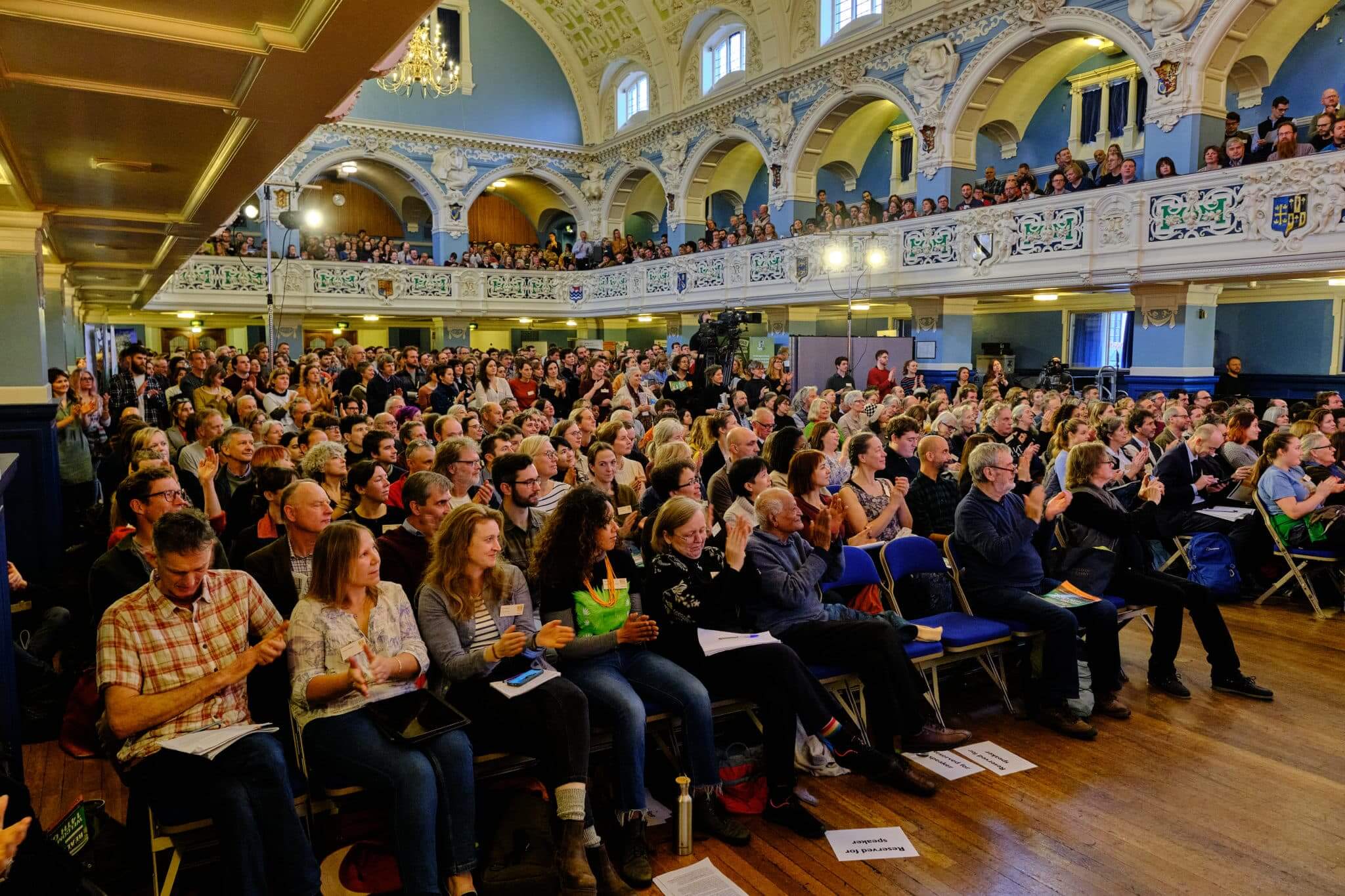A practical, social and political revolution in food and farming was underway in Oxford last week where campaigners, farmers and experts gathered over three days.
The Oxford Real Farming Conference, set up as a space for the radical, alternative approach to food and farming, hosted a wide-ranging programme that included everything from farming subsidies and policies to future diets, community farming, social justice and connection to the land.
“When the only success factor is productivity, this conversation would feel very bizarre and abstract,” said organic grower and author Claire Ratinon, about her session on cultivating belonging, but which could be applied to the conference as a whole. “When it’s also about personal, sustainable and financial profitability.”
A sense of interconnectedness was set up in the keynote interview with activist and author Vandana Shiva, who said: “The first thing is to see we are not that different from each other. The human capacity is very little compared to the web of life.
“The science is now reaffirming everything we’ve done – that soil health doesn’t just feed plants, but the health of our biome.”
When the only success factor is productivity, this conversation would feel very bizarre and abstract. Claire Ratinon, grower and author
Elsewhere, a lively panel tackled the topic of livestock in farming, with vegan farmer Iain Tolhurst speaking alongside micro dairy farmer and author Simon Fairlie, and Cumbrian regenerative farmer Nicola Renison, both of whom integrate livestock into sustainable systems.
Chair of the session, and BBC Food Programme presenter, Dan Saladino, said: “It’s rare but so obvious: the connections between what we eat, farm and produce, and our health.”
Cookery school founder Darina Allen added: “I hope I live to see the day where we can have practical cooking, gardening and foraging embedded in the school curriculum. You can’t eat a flippin’ maths book. Why are these skills looked on as lesser?”
While Tolhurst produces veg at medium scale with no animal inputs or manures, and Fairlie champions a small-scale closed loop system combining waste products with a micro dairy and supply chain, both agreed on the misguided focus on cheap food.
I hope I live to see the day where we can have practical cooking, gardening and foraging embedded in the school curriculum. Darina Allen, chef, TV presenter and founder of Ballymaloe Cookery School
“It’s not a cost-of-living crisis, it’s a housing crisis,” said Tolhurst, who noted that in debates around affordability, food is often at the centre of cost discussions while housing is rarely mentioned. Fairlie pointed out the price of wheat has fallen over recent decades, while the price of housing has soared.
Elsewhere in a panel looking at overlaps between existing and newer farming movements of organic, regenerative and agroecology, farmer Ben Andrews said: “I don’t call myself regenerative because I can’t prove it.”
But he added: “There is a preconception of what an organic farmer looks like. There’s a big divide and not enough meeting in the middle.”
Farmer Jake Freestone pointed out that the inclusivity of regenerative farming, which has no regulations, means it can scale up and help farming adapt to the climate crisis more quickly. “Climate change is a huge challenge to agriculture, bigger than anything else that’s happening around the world. We do not need to disturb the soil as much as we do,” he said.
Guy Singh-Watson, founder of organic veg box company Riverford, said he accepted the issues with organic, like a heavy reliance on ploughing, but said regenerative can include “a ridiculously wide range of things”.
Talking about the move to new farming subsidies that are expected to help farmers become more nature-friendly, Freestone reflected on a widespread lack of information and progress. He said: “On ELMs, we haven’t seen the full picture and we don’t know where we sit in the jigsaw.”
If you want to make a living out of a couple of acres of veg, you can’t compete with people who have come out of a bank and want a couple of acres to graze some horses. Jim Aplin, market gardener
Other sessions looked at the lack of skills required in horticulture or explored the links between land and social justice with policing and prisons.
Kelsey Mohamed, of justice collective Cradle Community, said: “For me one of the things is that consistently marginalised people have been either used to exploit land, or exploited, are now living in urban environments with really restricted access to green space.
“They are the primary targets for poorer health outcomes. The crowded areas are where the highest pollution is, with respiratory issues, and the worst access to food. It’s like we are continually punished for being who we are.”
Inequality was also linked to a loss of horticulture skills in rural communities, with market gardener and member of the Organic Growers’ Alliance, Jim Aplin, noting that: “The countryside is the preserve of the wealthy
“If you want to make a living out of a couple of acres of veg, you can’t compete [for land] with people who have come out of a bank and want a couple of acres to graze some horses.”
Aplin, who is based near Evesham in a once thriving district of small market gardens, said “it is feasible to do local food chains in this country, if there was a radical redesign of what we grow and where we grow it”.
Listing what this would entail, he said agroecological horticulture needs a fair return, access to land, training and markets, recognition of skills and affordable rural housing.









0 Comments